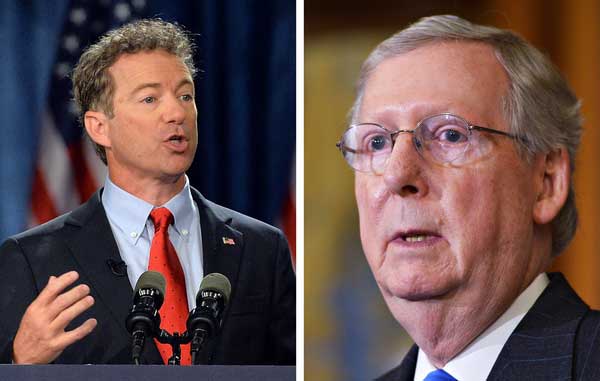6/1/2015

Republicans are furious at one of their own today, Kentucky’s Junior Senator and presidential hopeful Rand Paul, who nearly single-handedly took down the National Security Agency’s (NSA) authorization for its spying program. Section 215 of the USA Patriot Act officially expired at midnight, June 1st despite a frantic effort by fellow Kentuckian, Republican Senate Majority Leader Mitch McConnell. In a dramatic Sunday evening showdown, Paul fulfilled his vow that “the Patriot Act will expire tonight,” nixing McConnell’s fevered push to extend the Patriot Act, unamended, for an additional five years. Although McConnell, and fellow Senate hawks like John Cornyn (R-TX) and Richard Burr (R-NC), among others successfully blocked a vote on the widely supported NSA reform bill, the USA Freedom Act, earlier in the month, McConnell reluctantly accepted the Senate’s 77-17 vote to proceed with debate on the measure. The USA Freedom Act was overwhelmingly passed in the House of Representatives by a 338-88 vote on May 13th, but McConnell was able to drum enough support to block the bill in the upper-house. McConnell has been widely dismissive of the reform bill, however acquiescing that,“It’s now the only realistic way forward.” Due to procedural rules, the NSA spying program has been shut down, even if only for a few days. Depending on the amendment process, the USA Freedom Act will likely be voted on later in the week.
Sunday’s showdown in the Senate was incredibly dramatic, especially the dynamic between the two Kentucky Senators. McConnell had endorsed Paul for president, and by all accounts, they had a close personal relationship. The fallout from the session appears to be outward hostility against Paul, not just from McConnell, but from many Republican Senators. Paul’s 10-hour filibuster prior to the Memorial Day recess necessitated Sunday’s emergency session. The rift between Paul and the other Senators became even more pronounced when the junior Senator did not attend an hour-long meeting held by Republicans prior to Sunday’s vote. Paul, who is a noted civil libertarian, vowed in the days between his filibuster and Sunday’s session that he would not allow section 215 to pass. During Sunday’s session, he shouted on the Senate Floor, “I’m not going to take it anymore; I don’t think the American people are going to take it anymore.” Many have accused Paul of political grandstanding, as he has made personal liberty and governmental intrusion key components of his campaign. Saying that Paul “needs to learn the rules of the Senate,” former Republican presidential nominee, John McCain, said, “I think he obviously has a higher priority for his fundraising and political ambitions than for the security of the nation.”
Paul, sticking to his civil libertarian leanings, also opposes the USA Freedom Act, asking the Senate, “Are we going to so blithely give up our freedom? Are we going to so blindly go along and take it?” After his successful block of the Patriot Act extension and the Senate’s vote to proceed with the reforms, Paul acknowledged that his victory “will only be temporary. They will ultimately get their way.” The USA Freedom Act in its current form is widely supported in the House of Representatives; however, McConnell submitted a series of amendments to the bill to be reviewed over the next few days. Paul and Vermont’s Independent Senator and fellow presidential candidate, Bernie Sanders, both also proposed amendments to the bill, but were subsequently blocked. If amended, the bill will be returned to the House to approve or reject the amendments. Key House members like noted NSA critic, Justin Amash (R-MI) points out that, “On the House side, there’s not support for a more watered down version of the Freedom Act. If they want to get something passed through the House, they need to make it better not worse.” While the Obama administration prefers the USA Freedom Act over Section 215 of the Patriot, the president has been very vocal about maintaining some kind of NSA spying authority. Spokesman, Josh Earnest responded to the vote by saying, “The Senate took an important — if late — step forward tonight. We call on the Senate to ensure this irresponsible lapse in authorities is as short-lived as possible.”
Sources:
The Hill – Julien Hattem
Yahoo/AP – Erica Werner and Ken Dilanian
New York Daily News – Adam Edelman


Join the conversation!